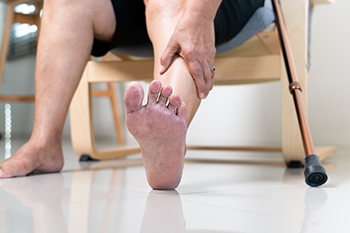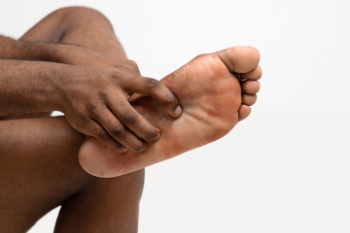December 2024
Causes of Foot Stress Fractures

Foot stress fractures occur when repeated stress or impact overwhelms the foot's bones, often from activities like running or jumping. A sudden increase in exercise intensity, duration, or frequency can place excessive strain on the bones, particularly if the body has not adjusted to the added workload. Changes in surface, such as moving from a soft running track to a hard sidewalk, may also trigger stress fractures. Wearing ill-fitting footwear that lacks proper support and cushioning can lead to uneven pressure distribution. Biomechanical issues, including bunions or improper gait, may force certain areas of the feet to bear more weight, which adds to the stress. Athletes, especially those involved in high-impact sports, are particularly vulnerable, but non-athletes engaging in prolonged walking or standing on hard or uneven surfaces can also develop stress fractures. A podiatrist can diagnose the injured foot using digital imaging and develop a treatment plan. If you experience foot pain after running, playing a sport or exercising, it is suggested that you schedule an appointment with a podiatrist to find out whether you may have developed stress fractures.
Stress fractures occur when there is a tiny crack within a bone. To learn more, contact one of our podiatrists from Bazzi Podiatry. Our doctors can provide the care you need to keep you pain free and on your feet.
How Are They Caused?
Stress fractures are the result of repetitive force being placed on the bone. Since the lower leg and feet often carry most of the body’s weight, stress fractures are likely to occur in these areas. If you rush into a new exercise, you are more likely to develop a stress fracture since you are starting too much, too soon. Pain resulting from stress fractures may go unnoticed at first, however it may start to worsen over time.
Risk Factors
- Gender – They are more commonly found in women compared to men.
- Foot Problems – People with unusual arches in their feet are more likely to develop stress fractures.
- Certain Sports – Dancers, gymnasts, tennis players, runners, and basketball players are more likely to develop stress fractures.
- Lack of Nutrients – A lack of vitamin D and calcium may weaken the bones and make you more prone to stress fractures
- Weak Bones – Osteoporosis can weaken the bones therefore resulting in stress fractures
Stress fractures do not always heal properly, so it is important that you seek help from a podiatrist if you suspect you may have one. Ignoring your stress fracture may cause it to worsen, and you may develop chronic pain as well as additional fractures.
If you have any questions, please feel free to contact one of our offices located in Detroit, West Detroit, Northwest Detroit, Sterling Heights, Hamtramck, Dearborn Heights, Madison Heights, Redford, and Livonia, MI . We offer the newest diagnostic and treatment technologies for all your foot care needs.
Are You Suffering From Ingrown Toenails?
Pain From Working on Your Feet

After working on your feet all day, foot pain is a common issue. This is especially true for those whose jobs require prolonged standing or walking, such as retail, healthcare, restaurant, and construction work. The constant strain from standing all day can lead to soreness, muscle fatigue, and discomfort, often made worse by iwearing mproper footwear or poor posture. Foot pain from working on your feet may also be linked to structural issues, like flat feet or high arches, as well as medical conditions like plantar fasciitis or tendonitis. A podiatrist can provide specific solutions to alleviate and prevent such pain, including recommending supportive footwear, custom orthotics, and exercises to strengthen foot muscles. They can also diagnose and help manage underlying conditions that might contribute to chronic discomfort. Neglecting foot pain can lead to more severe problems and reduced work productivity. If you experience foot pain after standing all day at work, it is suggested that you schedule an appointment with a podiatrist for an exam and treatment options.
While working on the feet, it is important to take the proper care of them. For more information about working on your feet, contact one of our podiatrists from Bazzi Podiatry. Our doctors will treat your foot and ankle needs.
Working on Your Feet
Standing on your feet for long periods of time can cause stress and pain in your feet. Your whole body may experience change in terms of posture, back pain, bunions, callouses and or plantar warts. There are ways to avoid these conditions with proper foot care, smart choices and correct posture.
Positive Changes
Negative heeled shoe – Choosing this shoe type places the heel slightly lower than the ball of the foot. These are great for overall foot health. Find shoes that fit you correctly.
Go barefoot – Our feet were not designed to be enclosed for all hours of the day. Try to periodically expose your feet to air.
Eliminate Pain
Foot Exercises – Performing simple exercises, incorporating yoga and doing stretches are beneficial. This will allow increased blood flow to the area and muscles of the foot.
Achilles tendon – Stretching the foot out flat on the floor will relax the calf muscles and tendon. These exercises can be performed almost anywhere. Make sure you add these exercises to your daily regimen.
With a little bit of this information and knowing more about foot health, you will notice changes. Foot stretches and proper footwear will help with pain and prevent further issues.
If you have any questions please feel free to contact one of our offices located in Detroit, West Detroit, Northwest Detroit, Sterling Heights, Hamtramck, Dearborn Heights, Madison Heights, Redford, and Livonia, MI . We offer the newest diagnostic and treatment technologies for all your foot and ankle needs.
How Aging Affects the Feet

As people age, their feet, toes, and ankles often undergo changes that can negatively affect mobility and overall health. Common foot issues among seniors include thickened or discolored toenails, which may result from reduced circulation or repeated injury over time. Aging can also lead to joint stiffness in the feet and ankles, reducing mobility and causing discomfort. Circulatory decline frequently impacts the skin, making it thinner, more fragile, and more susceptible to wounds or ulcers. Swelling in the feet and ankles may signal underlying conditions, such as heart or kidney disease, as these systems play a significant role in fluid retention and blood flow. Such changes in the feet and ankles can signal health problems before they worsen. A podiatrist can assess your symptoms, offer expert care, and recommend effective methods to manage them. If you are a senior who is experiencing foot or ankle irregularities, it is suggested that you schedule an appointment with a podiatrist for a thorough exam and appropriate treatment options.
Proper foot care is something many older adults forget to consider. If you have any concerns about your feet and ankles, contact one of our podiatrists from Bazzi Podiatry. Our doctors can provide the care you need to keep you pain-free and on your feet.
The Elderly and Their Feet
As we age we start to notice many changes in our body, but the elder population may not notice them right away. Medical conditions may prevent the elderly to take notice of their foot health right away. Poor vision is a lead contributor to not taking action for the elderly.
Common Conditions
- Neuropathy – can reduce feeling in the feet and can hide many life-threatening medical conditions.
- Reduced flexibility – prevents the ability of proper toenail trimming, and foot cleaning. If left untreated, it may lead to further medical issues.
- Foot sores – amongst the older population can be serious before they are discovered. Some of the problematic conditions they may face are:
- Gouging toenails affecting nearby toe
- Shoes that don’t fit properly
- Pressure sores
- Loss of circulation in legs & feet
- Edema & swelling of feet and ankles
Susceptible Infections
Diabetes and poor circulation can cause general loss of sensitivity over the years, turning a simple cut into a serious issue.
If you have any questions please feel free to contact one of our offices located in Detroit, West Detroit, Northwest Detroit, Sterling Heights, Hamtramck, Dearborn Heights, Madison Heights, Redford, and Livonia, MI . We offer the newest diagnostic and treatment technologies for all your foot and ankle needs.
Managing Plantar Fasciitis

Plantar fasciitis affects the broad band of tissue that connects the heel bone to the toes, known as the plantar fascia. Pain in the heel and arch of the foot is the result of excessive strain, tearing, or wearing out of this ligament. It is often most noticeable when taking the first steps in the morning, or after long periods of rest. Factors such as spending extended time on your feet, having tight calf muscles, high arches or flat feet can increase the risk of developing plantar fasciitis. A podiatrist can assess your symptoms and develop a treatment plan that may include using orthotics and performing specific calf and foot stretches to improve flexibility. In addition, taking smaller steps, avoiding walking barefoot, and reducing high-impact activities like jogging may be suggested. Weight management may also be part of the treatment strategy, as excess weight can increase pain. If you have pain from plantar fasciitis, it is suggested that you schedule an appointment with a podiatrist for treatment.
Plantar fasciitis can be very painful and inconvenient. If you are experiencing heel pain or symptoms of plantar fasciitis, contact one of our podiatrists from Bazzi Podiatry. Our doctors can provide the care you need to keep you pain-free and on your feet.
What Is Plantar Fasciitis?
Plantar fasciitis is the inflammation of the thick band of tissue that runs along the bottom of your foot, known as the plantar fascia, and causes mild to severe heel pain.
What Causes Plantar Fasciitis?
- Excessive running
- Non-supportive shoes
- Overpronation
- Repeated stretching and tearing of the plantar fascia
How Can It Be Treated?
- Conservative measures – anti-inflammatories, ice packs, stretching exercises, physical therapy, orthotic devices
- Shockwave therapy – sound waves are sent to the affected area to facilitate healing and are usually used for chronic cases of plantar fasciitis
- Surgery – usually only used as a last resort when all else fails. The plantar fascia can be surgically detached from the heel
While very treatable, plantar fasciitis is definitely not something that should be ignored. Especially in severe cases, speaking to your doctor right away is highly recommended to avoid complications and severe heel pain. Your podiatrist can work with you to provide the appropriate treatment options tailored to your condition.
If you have any questions please feel free to contact one of our offices located in Detroit, West Detroit, Northwest Detroit, Sterling Heights, Hamtramck, Dearborn Heights, Madison Heights, Redford, and Livonia, MI . We offer the newest diagnostic and treatment technologies for all your foot and ankle needs.
Understanding Debridement for Diabetic Foot Ulcers

Diabetic foot ulcers are open sores or wounds that can develop on the feet of individuals with diabetes due to poor circulation and nerve damage. These ulcers can become chronic, slow to heal, and prone to infection if left untreated. An important treatment for managing diabetic foot ulcers is debridement, a process where dead or infected tissue is carefully removed from the wound. Debridement is essential because it stimulates healthy tissue growth, reduces the risk of infection, and promotes faster healing by allowing the body’s natural repair processes to function effectively. By removing dead tissue, debridement helps improve blood flow to the area, which is vital for recovery in diabetic patients with circulation issues. If you suffer from diabetic foot ulcers, it is suggested that you schedule appointments with a podiatrist for regular debridement, to prevent complications, avoid further tissue damage, and ultimately protect the foot from severe infection or amputation.
Wound care is an important part in dealing with diabetes. If you have diabetes and a foot wound or would like more information about wound care for diabetics, consult with one of our podiatrists from Bazzi Podiatry. Our doctors will assess your condition and provide you with quality foot and ankle treatment.
What Is Wound Care?
Wound care is the practice of taking proper care of a wound. This can range from the smallest to the largest of wounds. While everyone can benefit from proper wound care, it is much more important for diabetics. Diabetics often suffer from poor blood circulation which causes wounds to heal much slower than they would in a non-diabetic.
What Is the Importance of Wound Care?
While it may not seem apparent with small ulcers on the foot, for diabetics, any size ulcer can become infected. Diabetics often also suffer from neuropathy, or nerve loss. This means they might not even feel when they have an ulcer on their foot. If the wound becomes severely infected, amputation may be necessary. Therefore, it is of the upmost importance to properly care for any and all foot wounds.
How to Care for Wounds
The best way to care for foot wounds is to prevent them. For diabetics, this means daily inspections of the feet for any signs of abnormalities or ulcers. It is also recommended to see a podiatrist several times a year for a foot inspection. If you do have an ulcer, run the wound under water to clear dirt from the wound; then apply antibiotic ointment to the wound and cover with a bandage. Bandages should be changed daily and keeping pressure off the wound is smart. It is advised to see a podiatrist, who can keep an eye on it.
If you have any questions, please feel free to contact one of our offices located in Detroit, West Detroit, Northwest Detroit, Sterling Heights, Hamtramck, Dearborn Heights, Madison Heights, Redford, and Livonia, MI . We offer the newest diagnostic and treatment technologies for all your foot care needs.





